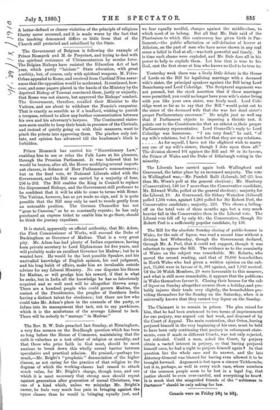The Rev. R. W. Dale preached last Sunday, at Birmingham,
a very fine sermon on the Bracllangh question which has been so long before the House of Commons, maintaining that the oath is valueless as a test either of religion or morality, and that those who prize faith in God most, should be most anxious to break down this wholly unreal barrier between speculative and practical atheism. He praised,—perhaps too much,—Mr. Bright's "prophetic" denunciation of the higher classes, as not caring for the practice of that religion to the dogmas of which the working-classes had ceased to attach much value, for Mr. Bright's charge, though true, and one which it is most necessary that strong men should repeat against generation after generation of unreal Christians, Was one of a kind which, unless we misjudge Mr. Bright's career, he feels very much less pain in bringing against the upper classes than he would in bringing equally just, and
we fear equally needful, charges against the middle-class, to which most of us belong. But all that Mr. Dale said of the Pharisaism to which this controversy has given birth in Par- liament,—the public affectation or self-delusion of horror at Atheism, on the part of men who have never shown in any real sense a belief in God at all,—was both powerful and timely. It is time such shams were exploded, and Mr. Dale does all in his power to help to explode them. Let him that is true to his God, cast the first stone at him who knows no God to be true to.


































 Previous page
Previous page